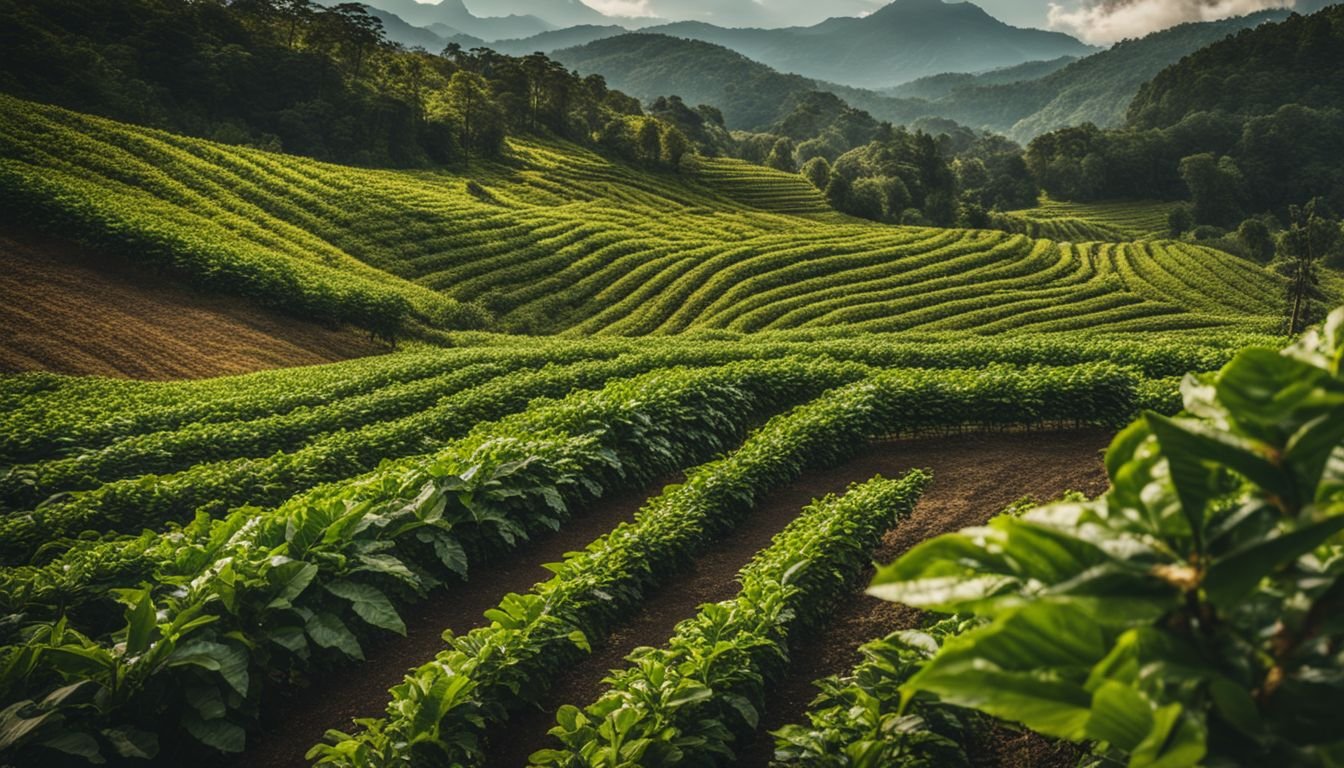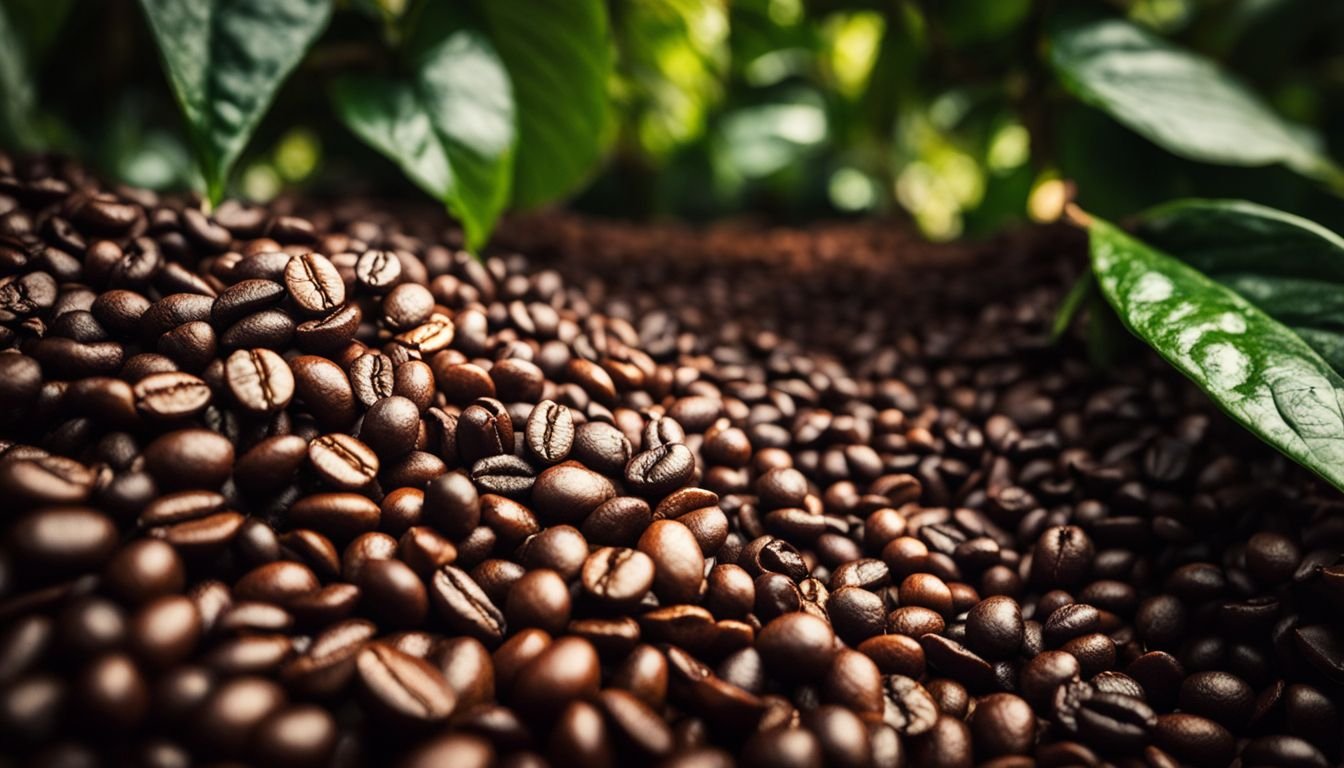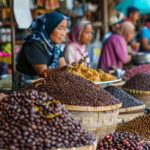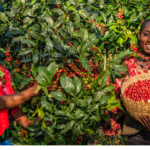You’re probably sipping on a cup of coffee right now, but have you ever wondered where your Kenyan coffee comes from? Kenya’s highlands offer the perfect conditions for growing some of the world’s most sought-after Arabica coffee beans.
In this article, we’ll unravel the rich tapestry that is Kenyan coffee—its origins, history, and unique production areas—to give you a deeper appreciation for every flavorful sip.
Discover the story behind your brew!
Key Takeaways
- Kenyan coffee started when French missionaries planted the first trees in 1893.
- The Arabica coffee from Kenya is known for its complex flavors and grows best in high altitudes.
- Big challenges hit Kenya’s coffee industry in the 1980s and 1990s, but it still thrived later.
- Coffee regions like Mount Kenya have the perfect soil and rain for growing quality beans.
- Farmers use both wet and dry methods to process coffee, with some using double fermentation to make the flavor richer.
The History of Coffee in Kenya

Coffee was first introduced to Kenya by French missionaries in the 19th century, and it wasn’t until the 20th century that coffee production really took off. During colonial times, large coffee estates were established, and after gaining independence in 1963, Kenyan farmers began to form cooperatives to market their coffee collectively.
However, the industry faced challenges in the 1980s and 1990s due to mismanagement and corruption within the government, leading to a decline in production.
Introduction of coffee in Kenya
Missionaries brought coffee to Kenya in 1893. They imported Bourbon Coffee from Brazil. This was the start of coffee growing in the country. Soon, British colonizers made rules about who could grow coffee.
White settlers got to grow it and Africans had to work for them, often for little or no pay.
Kenya’s journey with coffee started small but grew over time. The early years from 1850-1900 set the stage for a booming industry later on.
Early years: 1850-1900
Coffee did not start growing in Kenya until missionaries brought it at the end of the 19th century. They planted these first coffee trees around 1893. The plant thrived thanks to Kenya’s rich volcanic soils and ideal climate.
At first, only white settlers could farm coffee due to British rules. Kenyans watched as their land grew a valuable crop they could not touch.
The times were changing, though, leading up to the colonial era where coffee took on a new role in Kenya’s history.
Colonial era: 1900-1963
During the colonial era, British rulers decided that only white settlers could grow coffee in Kenya. They made it a law. This time was tough for Africans who loved coffee. They had to work on the plantations without pay or just a little bit of money.
The rules were very strict and unfair.
Things started to change after the Mau Mau uprising against British control. Some African farmers finally got the chance to grow coffee themselves. But they still faced many rules about how and where they could sell their coffee beans.
It was not easy, but these changes laid the groundwork for Kenya’s future in coffee farming.
Independence and rise of the coffee industry: 1963-1980
After Kenya gained independence in 1963, significant changes were made to the coffee industry. Reforms provided coffee growers with more control over production and sale. Prior to this, strict government regulations constrained who could grow and sell coffee, as well as how the beans could be used.
The rise of the Kenyan coffee industry during 1963-1980 was closely tied to the country’s newfound independence and these reformations.
During this period following independence, Kenya saw growth and progress within its own economy specifically fueled by developments in its lucrative coffee industry.
Challenges in the 1980s and 1990s
The 1980s and 1990s posed significant challenges for Kenya’s coffee industry. Government restrictions on coffee growing and selling had a profound impact. The limited opportunities for Kenyans to produce and manufacture their own coffee added to these hardships, affecting the quality and trade of Kenyan coffee during this period.
These limitations restricted the potential growth of the coffee industry In Kenya during the two decades, impacting both local production standards and global market competitiveness.
Different Types of Kenyan Coffee

When it comes to Kenyan coffee, there are mainly two types – Arabica and Robusta. The Arabica variety is grown in higher altitudes and is known for its complex flavors, while the Robusta variety is more resilient and has a stronger, full-bodied taste.
Some popular varieties of Kenyan coffee include SL28, SL34, and Ruiru 11. These different types of coffee beans contribute to the unique flavor profile that Kenyan coffee is known for.
Arabica vs Robusta
Kenya exclusively grows Coffea Arabica, known for its delicate flavors and pleasant acidity. It accounts for 75-80% of the world’s coffee production. On the other hand, Coffea Robusta originated in West African forests and is more robust with a stronger, harsher taste.
Kenyan highlands offer ideal conditions for producing high-quality Arabica coffee due to volcanic soils and good rainfall.
Coffea Arabica features delicate flavors and pleasant acidity while Coffea Robusta has a stronger, harsher taste originating in West African forests. Kenya’s climate offers ideal conditions for high-quality Arabica coffee production with volcanic soils and good rainfall.
Popular varieties (SL28, SL34, Ruiru 11)
After understanding the differences between Arabica and Robusta, let’s dive into the popular varieties associated with Kenyan coffee production, known for their unique flavors and characteristics:
- SL28: This variety is renowned for its excellent cup quality, with notes of blackcurrant and complex acidity. It’s known for producing a full-bodied, winey cup.
- SL34: With a taste profile often characterized by a sweet berry flavor and bright acidity, SL34 is favored for its balanced and aromatic qualities.
- Ruiru 11: Recognized for its disease resistance and high yield, Ruiru 11 offers a distinctive cup with flavors ranging from citrusy to chocolatey notes.
Major Regions of Coffee Production in Kenya
Kenya’s coffee production is concentrated in several major regions, with the high plateaus of Mount Kenya and Aberdare Range being key areas. Other significant coffee-producing regions include Kisii, Nyanza, Bungoma, Nakuru, and Kericho.
Additionally smaller regions such as Kilimanjaro, Meru, and Nyeri also contribute to Kenya’s vibrant coffee industry.
The high plateaus: Mount Kenya and Aberdare Range
The high plateaus of Mount Kenya and Aberdare Range create the perfect conditions for producing top-quality Arabica coffee. The volcanic soils in this region, combined with ample rainfall, contribute to the unique flavor profiles and high quality of Kenyan coffee.
The elevation and climate here result in a slow development process for the coffee beans, enhancing their flavor complexity that coffee lovers worldwide appreciate.
Coffee from these areas is highly sought after due to its distinct characteristics influenced by its surroundings. These regions play a significant role in shaping the global perception of Kenyan coffee, making them essential destinations for anyone eager to explore the origins of their favorite brews.
Kisii, Nyanza, Bungoma, Nakuru, and Kericho
These regions extending from the high plateaus hold significant importance in the history and production of Kenyan coffee. Let’s delve into the specific contributions of each region:
- Kisii: Known for its moderate climate and fertile lands, Kisii produces distinctive coffee with a bright acidity and fruity undertones. The coffee cherries thrive in this region, offering opportunities for unique flavor profiles.
- Nyanza: With its tropical climate and rich volcanic soils, Nyanza region is renowned for producing bold and full-bodied coffee beans. The combination of rainfall and altitude contributes to the exceptional quality of Nyanza’s coffee.
- Bungoma: The lush landscapes and equatorial climate in Bungoma result in flavorful coffee beans with a rich aroma and balanced acidity. This region’s dedication to sustainable farming practices has led to high-quality, sought-after coffee.
- Nakuru: Situated at higher elevations with cool temperatures, Nakuru produces premium Arabica coffee known for its delicate floral notes and smooth finish. The unique terroir imparts an unmistakable character to the coffee grown here.
- Kericho: Characterized by its high altitudes, ample rainfall, and well-drained soils, Kericho yields exquisite Arabica varietals celebrated for their bright acidity and wine-like sweetness. The favorable conditions make Kericho a vital contributor to Kenya’s renowned coffee industry.
Smaller regions (Kilimanjaro, Meru, Nyeri, etc.)
Kilimanjaro, Meru, and Nyeri are smaller regions known for their significant contributions to the coffee industry in Kenya. These regions play a vital role in the diversity and richness of Kenyan coffee. Nyeri region is renowned for producing some of the highest quality Kenyan coffee. Kilimanjaro is associated with major coffee production in Kenya, contributing to the country’s rich coffee heritage. Meru, another smaller region, also makes a noteworthy contribution to Kenya’s thriving coffee industry.
Coffee Processing in Kenya
In Kenya, coffee processing involves two main methods: wet processing and dry processing. The unique double fermentation method is also used in some regions of Kenya to enhance the flavor profile of the coffee beans.
Wet processing method
Kenyan coffee is produced using the wet processing method, which involves pulping and fermenting the coffee cherries to separate the pulp from the beans. This process helps in enhancing the flavor profile of Kenyan coffee, making it one of the best in the world.
To maintain quality, Kenyan coffee farmers focus on disease control, insect pest management, pruning, timely harvests, and efficient processing.
The wet processing method used in Kenya ensures that every cup of Kenyan coffee delivers a delightful taste that sets it apart globally. Quality and attention to detail are key factors contributing to this distinctive flavor profile.
Dry processing method
Following the wet processing method is the dry process, a traditional and labor-intensive approach essential to Kenyan coffee production. With this method, coffee beans are spread out in the sun to dry naturally.
This allows the natural sugars and flavors to concentrate within the bean, giving it a more distinct and complex flavor profile. Many believe that this meticulous process plays a significant role in enhancing the unique characteristics of Kenyan coffee beans, contributing to their high quality.
This time-consuming but crucial method requires careful monitoring and attention to detail during the drying stage. It’s no surprise that many coffee enthusiasts favor this technique for its ability to bring out a truly exceptional taste in each cup of Kenyan coffee.
Unique Kenyan processing method (double fermentation)
The double fermentation method gives Kenyan coffee its renowned rich, bright flavor. It involves two stages of wet and dry fermentation, meticulously enhancing the beans’ quality. This unique practice is a result of years of careful attention to detail, influencing the distinctive hints of blackcurrant, honey, and lavender found in Kenyan coffee – making it truly exceptional.
Kenyan coffee’s double fermentation process has been preserved and refined by dedicated growers over time. The tradition sets Kenyan coffee apart from others worldwide and contributes significantly to its esteemed reputation for superior quality with an unmatched flavor profile that captivates every coffee enthusiast.
Impact of Kenyan Coffee on the Global Coffee Market
Kenyan coffee has made a significant impact on the global coffee market with its high-quality beans, influencing prices and setting standards for other coffee-producing regions. Find out more about how Kenyan coffee has shaped the global industry by reading our full blog!
Quality and reputation
Kenyan coffee is recognized for its exceptional quality and distinguished reputation in the global coffee market. The distinct flavor profile of Kenyan Arabica, with notes of blackcurrant, honey, and a hint of lavender, sets it apart.
Notably, Kenya AA beans are revered worldwide for their large size and premium quality, showcasing the commitment to excellence in every cup.
The reputation of Kenyan coffee extends further as it influences coffee prices internationally and holds a prominent position in direct sales. Additionally, the Rainforest Alliance certification emphasizes Kenya’s dedication to sustainable practices, contributing to its positive image on the global stage.
Influence on coffee prices
Kenyan coffee’s high quality and distinct flavor, especially the Kenya AA graded beans, contribute to its higher market value, making it influential in setting global coffee prices.
Government restrictions until 1960 also impacted supply and demand, further influencing international prices. With innovative strategies for production, marketing, and exportation of coffee beans, Kenya’s industry can continue impacting global prices.
Moving forward to how Kenyan Coffee is Linked to International Trade..
International trade
Kenyan coffee is in high demand worldwide, and the country exports almost all of its production. This makes Kenya a major player in the global coffee market. The United States, Germany, Belgium, and Sweden are some of the top importers of Kenyan coffee, with consumers willing to pay premium prices for its exceptional quality.
Fair trade practices have been put in place to ensure that Kenyan coffee farmers receive fair compensation for their hard work.
Sustainable and ethical trading practices play a crucial role in meeting international demand for Kenyan coffee. The industry contributes significantly to Kenya’s economy by generating foreign exchange earnings and creating employment opportunities.
Sustainability and the Future of Kenyan Coffee
Kenyan coffee faces sustainability challenges due to climate change, disease, and fluctuating market prices. Efforts to promote sustainable farming practices and support smallholder farmers are crucial for the future of Kenya’s coffee industry.
Factors affecting sustainability
High altitudes, volcanic soils, and ample rain support coffee growth. Climate change disrupts these ideal conditions. Soil degradation from overuse threatens sustainability. Inadequate income for smallholders affects long-term commitment to quality.
Efforts supporting sustainable practices are key. Investments in climate-resilient farming methods aid adaptation. Encouraging fair payment secures farmer livelihoods and motivates coffee quality upkeep.
Maintaining the balance between economic needs and environmental preservation is crucial for future sustainability.
Efforts to promote sustainable practices
Kenyan coffee farmers are actively adopting sustainable practices to protect the environment and ensure the longevity of their crops. By implementing organic farming methods, such as composting and natural pest control, they aim to minimize chemical use while maintaining the high quality of their coffee plants.
Collaborating with organizations like the Kenya Coffee Producer’s Association, farmers are embracing eco-friendly techniques that support biodiversity and reduce environmental impact, contributing to a more sustainable future for Kenyan coffee production.
The Kenya Coffee Board is also playing a crucial role in promoting sustainability by providing training on best agricultural practices and supporting initiatives for fair trade and ethical sourcing.
Potential challenges and opportunities for the future
As the Kenyan coffee industry continues to focus on sustainable practices, potential challenges and opportunities for the future arise. Historical inequalities and power dynamics pose challenges in achieving equitable growth across the sector.
However, innovative efforts aimed at addressing these issues open up opportunities for enhancing socioeconomic welfare among coffee producers. The high-altitude regions provide an ideal environment for specialty coffee production, presenting a promising outlook for sustainable and quality-focused approaches in the industry.
With organizations like the Kenya Coffee Producer’s Association driving positive change, the future holds potential for continued innovation and positive impact on both local communities and global markets.
Conclusion
In conclusion, Kenyan coffee has a rich history and is renowned for its high-quality Arabica beans. The diverse regions of coffee production in Kenya contribute to the unique flavors and profiles of Kenyan coffee.
Understanding the origin, types, and processing methods has highlighted how the industry has evolved over time. Emphasizing sustainability and future prospects shows an enduring commitment to maintaining quality while addressing challenges.
Exploring the impact on the global market underscores the significance of Kenyan coffee within the broader coffee industry. Considering these aspects allows for deeper appreciation of Kenyan coffee’s cultural, economic, and agricultural significance.
FAQs
1. How did coffee start in Kenya?
Coffee came to Kenya with the British when it was a British colony, and they started growing it in places like Mt. Kenya.
2. What kinds of coffee do they grow in Kenya?
In Kenya, farmers mostly grow Coffea Arabica and some other types like Coffea canephora and Coffea Excelsa for their rich coffee flavor profiles.
3. Where is Kenyan coffee sold?
Kenyan coffee is bought and sold at the Nairobi Coffee Exchange, which plays a big part in the Kenyan economy.
4. Who grows coffee in Kenya?
Small farms owned by local families called smallholdings make a lot of the Kenyan coffee, often working together as cooperatives.
5. Why is Kenyan coffee important to the country?
Kenya’s economy relies heavily on agricultural products such as roasted and green coffee beans that are exported from regions all around Mt. Kenya.
6. Has anything ever threatened Kenyan Coffee production?
Yes, issues like Mau Mau War affected farming stability while diseases such as Coffee Leaf Rust have also posed threats to crops over time.






